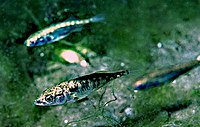
Host preference, acaricides effects and population growth of Polyphagotarsonemus latus (Banks) (Acari: Tarsonemidae) on white and colored cotton cultivars.
Sign Up to like & getrecommendations! Published in 2020 at "Pest management science"
DOI: 10.1002/ps.6010
Abstract: BACKGROUND White and colored fiber cotton cultivars have been developed to increase production and opportunities for family farming. The broad mite, Polyphagotarsonemus latus (Banks) is an important pest in cotton crops, nevertheless, different cotton cultivars… read more here.
Keywords: population growth; host preference; cotton cultivars; cotton ... See more keywords

Host-preference and parasitic capacity of new candidates of Trichogramma species (Hym.:Trichogrammatidae) against some stored product moths
Sign Up to like & getrecommendations! Published in 2019 at "Journal of Stored Products Research"
DOI: 10.1016/j.jspr.2018.11.006
Abstract: Abstract The host-preference and parasitic capacity of some local Trichogramma spp. (T. bourarachae, T. cordubensis, T. euproctidis and T. cacociae) towards four species of stored product moth eggs were investigated in order to select new candidate species for use… read more here.
Keywords: parasitic capacity; host preference; host; stored product ... See more keywords

Phenotypic and genotypic characterization of Phytophthora infestans isolates associated to tomato and potato crops in Colombia.
Sign Up to like & getrecommendations! Published in 2022 at "Phytopathology"
DOI: 10.1094/phyto-04-21-0158-r
Abstract: Late blight disease, caused by the plant pathogen Phytophthora infestans, is one of the major threats for tomato and potato crops. Monitoring the populations of P. infestans is important to determine if there are changes… read more here.
Keywords: host preference; potato; phytophthora infestans; tomato potato ... See more keywords

Plant virus infection modifies plant pigment and manipulates the host preference behavior of an insect vector
Sign Up to like & getrecommendations! Published in 2020 at "Entomologia Experimentalis et Applicata"
DOI: 10.1111/eea.12944
Abstract: Insect‐borne plant viruses may modify the phenotype of their host plants and thus influence the responses of insect vectors. When a plant virus modifies host preference behavior of a vector, it can be expected to… read more here.
Keywords: plant virus; plant; host preference; preference behavior ... See more keywords

Learning‐induced host preference in male parasitoid wasps as a potential driver of ecological speciation
Sign Up to like & getrecommendations! Published in 2018 at "Journal of Evolutionary Biology"
DOI: 10.1111/jeb.13363
Abstract: Ecological speciation via a host shift plays an important role in the diversification of phytophagous and parasitic insects. However, it is not clear how separation is maintained among initial populations in which genetic separation mechanisms… read more here.
Keywords: ecological speciation; host species; preference; induced host ... See more keywords

First Description of the Nuclear and Mitochondrial Genomes and Associated Host Preference of Trichopoda pennipes, a Parasitoid of Nezara viridula
Sign Up to like & getrecommendations! Published in 2023 at "Genes"
DOI: 10.3390/genes14061172
Abstract: Trichopoda pennipes is a tachinid parasitoid of several significant heteropteran agricultural pests, including the southern green stink bug, Nezara viridula, and leaf-footed bug, Leptoglossus phyllopus. To be used successfully as a biological control agent, the… read more here.
Keywords: mitochondrial genomes; trichopoda pennipes; nezara viridula; host ... See more keywords

Host Preference of Bactrocera latifrons (Hendel) (Diptera: Tephritidae) Among Fruits of Solanaceous Plants
Sign Up to like & getrecommendations! Published in 2021 at "Insects"
DOI: 10.3390/insects12060482
Abstract: Simple Summary Bactrocera latifrons (Diptera: Tephritidae) is the major pest in economic chili and eggplant of Thailand. Although B. latifrons has many host plant species, it does not unequally prefer each host plant. Results of… read more here.
Keywords: bactrocera latifrons; fruit; host preference; host ... See more keywords

Population Density and Host Preference of the Japanese Pine Sawyer (Monochamus alternatus) in the Qinling–Daba Mountains of China
Sign Up to like & getrecommendations! Published in 2023 at "Insects"
DOI: 10.3390/insects14020181
Abstract: Simple Summary Monochamus alternatus is not only a serious trunk-boring pest but also the most important and effective vector of the pine wood nematode. The effective control of M. alternatus can effectively limit the spread… read more here.
Keywords: alternatus; population density; pine; host ... See more keywords